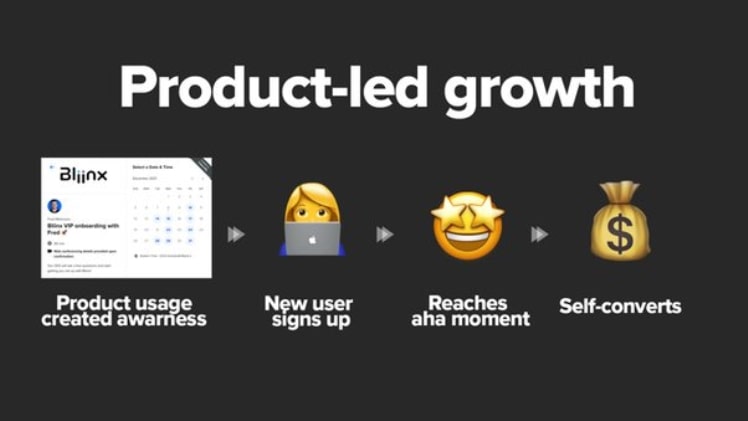Product-led growth shifts the focus of growth for businesses from a sales-led strategy to primarily their products, features, and services. Upon adopting the product-led growth approach, your product drives acquisition, conversion, and expansion, and your sales and marketing efforts revolve around the product.
In simpler words, if your product is valuable, it can attain rapid growth. While it sounds extremely simple, it takes a complete change in how your business functions. However, the first change it requires is a mindset shift. Here are some reasons that have been driving businesses to have a mindset shift and embrace product-led growth.
-
What Led Businesses to Embrace the Product-Led Growth Approach?
A traditional sales strategy focuses on taking a prospect from one to another in their sales cycle. However, identifying different factors that play a role in taking leads through different stages of the sales cycle has always been challenging.
As buyers’ behavior keeps changing over time, there’s a need to keep up with the changes by modifying the sales strategy. Businesses have now realized that targeting the product is an effective way to convert leads. There are several reasons, besides the sales-led approach being complex, that have driven businesses to adopt the product-led growth approach.
1. Startups Are More Expensive to Grow
While it has always been expensive to build a SaaS company, another challenge that startups face is high competition. As a result, companies spend significantly more on acquiring customers.
Over the years, many more channels have been developed for marketing in addition to Google, YouTube, LinkedIn, Facebook, etc. Nevertheless, marketing efforts demand significant financial resources irrespective of the channel used.
While customer acquisition costs have increased by over 50% in the five years prior to 2018, there has been a 30% drop in customers’ willingness to spend on features in the same period (ProfitWell). This means, that while companies have been paying more on CAC, it has not led to growth in sales and revenue generation.
2. Buyers Like to Self-Educate
Business to Consumer space is now dominated by buyers who are more proactive about their buying decision rather than allowing companies to influence their buying decision. While true for B2C businesses, buyers from the B2C space also like to self-educate rather than learn about products from salespeople.
Since buyers like to try software or products and their features before making a decision about their purchase, businesses, irrespective of their size, find the product-led growth approach more viable.
Focusing on building the product such that it is capable of driving more conversion and sales is far more effective than modifying and streamlining sales strategies or picking more capable salespersons who can advertise the products such that it appeals to potential buyers. Strategies such as providing users with a free trial or freemium allow them to experience the software or product and make a buying decision based on this experience.
3. Buying Process Greatly Depends on Product Experience
Products like Spotify and Netflix are great examples of how product-led growth can transform your rate of conversions and revenue generation. These products don’t require a salesperson to walk the user through their features.
Instead, the product handles all of this by giving the user an experience and then taking them through the onboarding and upgrading process without needing human intervention. While this does not mean companies don’t need sales reps at all, it, however, indicates that while the sales teams take care of several aspects, the product is allowed to do the heavy lifting.
-
Is Product-Led Growth New?
Product-led growth directly translates to building a strong product that is as close to the needs of its market as it can be. While product-led growth as a distinct approach is relatively new, the concept has been around since time immemorial.
There have always been businesses and brands that have had an impact on buyers primarily because of the product. However, the conception of product-led growth as an approach has helped businesses in today’s times to be more aware of the processes that they follow to improve their sales and ROI.
There’s no denying that product-led growth is a paradigm-shifting approach for B2C and B2C SaaS companies in modern times. However, changing how you function from sales-led strategies to product-led growth strategies requires a whole transformation in the process and operations. It requires your teams to have a new mindset as they go about the sales and marketing processes. Before you sign up for this transformation, you should analyze how useful this approach can be for your business.





